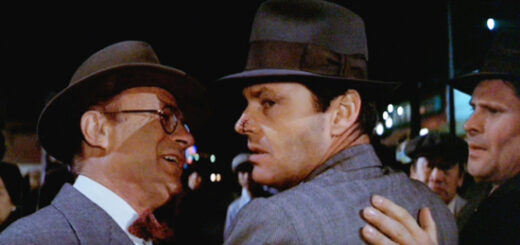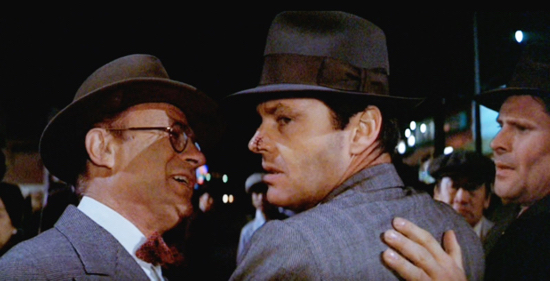Mindy Newell: I’m Twisted
Friday’s latest plot twist in this year’s Presidential campaign – the announcement that the FBI was reopening its investigation into Hillary’s e-mails based on some suspicious correspondence found on Anthony Weiner’s computer – had all of us spinning our heads like Linda Blair in The Exorcist…sans pea soup vomit, I hope.
Well, none of us knows yet the results of the election – now only eight days away, as the media would say in its annoyingly obsessive countdown – but one more immediate result was that it had me thinking about great fictional plot twists that none of us, or at least most of us, didn’t see coming, the ones that made go Whoa, Nellie!!!!
Star Wars: The Empire Strikes Back
Darth Vader: “Obi-wan never told you what happened to your father.”
Luke: “He told me enough. He told me you killed him.
Darth Vader: “No. I am your father.”
Im-not-so-ho, the greatest plot twist ever. Search your hearts, you know it to be true.
Planet of the Apes
Taylor: “Oh, my God. I’m back. All the time, it was…we finally really did it.”
Taylor: “You maniacs! You blew it up! God damn you! God damn you all to hell!”
The original, not the remake. Oh, definitely not the remake.
And definitely the second-best twist ever. Imho, of course. YMMV.
The Sixth Sense
“I see dead people.”
The story of Cole Sear, a boy whose ability to see ghosts has sent him into a deep depression and an alienation from the world and from his desperate mother, and of Dr. Malcolm Crowe, the child psychologist who tries to help him, is a film whose plot twist totally sent the public’s head spinning – some people may have vomited pea soup from some of the gorier and emotionally upsetting scenes – in 1999.
The beauty of the film is M. Night Shyamalan’s writing and direction, for as an audience we became involved in the story unfolding before our eyes, which on the surface was a modern-day family drama with some, uh, creepier aspects, and totally missed the clues so beautifully woven into the storyline and superb cinematography of Tak Fujimoto – the color red, absent from movie’s pallet except when the “afterlife” is intersecting with our world; the drop in temperature whenever a ghost is around (Cole’s mother complains about the house being cold, we can see Cole’s breath in the red tent when the little girl visits him; Cole’s mother never interacts with her son’s psychologist; and Malcolm never interacts with his environment (touching or moving objects) except around Cole. Well, until the end of the movie, and that red doorknob.
The twist – that Malcom is dead – should also have been as plain as the noses on all our faces when Cole, in the hospital, tells Malcolm “…They only see what they want to see. They don’t know they’re dead.” But we were all so caught up in Cole’s personal trauma that we, collectively, only thought that Malcom was helping Cole by getting him to admit what was at the heart of his, uh, troubles.
The Others
Grace: “If you’re dead, then leave us in peace. Leave us in peace!”
Mrs. Mills: “And suppose we do leave you, ma’am, do you suppose that they will?”
Grace: “Who?”
Mrs. Mills: “The intruders.”
World War II has ended, and on the Isle of Jersey Grace Stewart and her two children are awaiting the return of her husband from the front. Her daughter Anne insists that she has seen “others” in the house, and when three servants appear on Grace’s doorstep in answer to her advertisement, other strange and creepy occurrences start to happen; curtains are taken down, the piano, dusty and out of tune, is heard being played in perfect resonance, Grace hears voices, and her son reports meeting a boy named Victor who told him that he (Victor) lives there with his family.
The twist: Stricken with grief upon the news of her husband’s death in the war, Grace went mad and smothered her children in their sleep, and then shot herself. Waking up the next morning to find her and the children still alive (the kids are pillow fighting) Grace believes that she has been given another chance by God to prove herself to be a good mother. But the real truth is that it is Grace, her children, and her servants who have been haunting the current occupants of the house – Victor and his family. It is they who took down the curtains, who played the piano, whose voices were heard by Grace. The family leaves the house, unable to exorcise Grace and her children, and as they drive off, we see Grace and the children watching them from a window as Grace promises the children that they will never leave their home.
Other great movies with great plot twists not seen coming include:
Chinatown:
“Forget it, Jake. It’s Chinatown.”
Evelyn Mulwray reveals to Jake Gittes that her sister is actually her daughter; she has had an incestuous relationship with her father, Noah Cross.
The Usual Suspects:
“Who is Keyser Soze? He is supposed to be Turkish. Some say his father was German. Nobody believed he was real. Nobody ever saw him or knew anybody that ever worked directly for him, but to hear Kobayashi tell it, anybody could have worked for Soze. You never knew. That was his power. The greatest trick the Devil ever pulled was convincing the world he didn’t exist. And like that, poof. He’s gone.”
Keyser Soze is Verbal Kint.
Primal Fear
Martin Vail: “So there never… there never was a Roy?”
Roy: “Jesus Christ, Marty. If that’s what you think, I am disappointed in you, I don’t mind telling you. There never was an Aaron… counselor! Come on, Marty, I thought you had it figured, there at the end. The way you put me on the stand like that? That was fucking brilliant, Marty! And that whole thing like “act-like-a-man”? Jesus, I knew exactly what you wanted from me. It was like we were dancing, Marty!”
Aaron Stamper never existed, never had multiple personality disorder. It was always Roy.
Let me know what you think. Is Empire’s reveal better than Planet of the Apes? What have I left off the list? Did you guess the twists before they occurred, or did you just “say” you did around the water cooler?
Yeah, just like bowties, plot twists are cool.
Except in this year’s presidential election.













